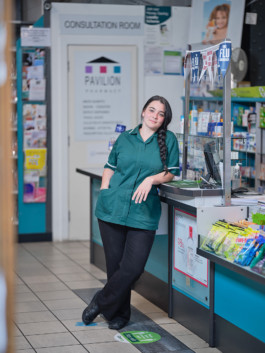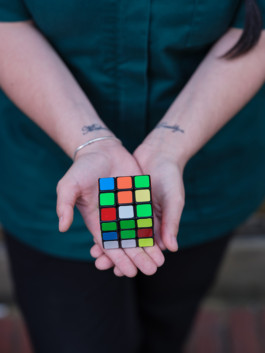Charlene: “Covid may be simple, yes it’s a virus, but there are so many different layers… It’s like a Rubik’s Cube”


listen:
Photography: Amit Lennon
Audio Producer: Nathan Gower
read:
Even though it’s a simple looking toy, it sums up Covid massively.
Covid may seem simple, yes, it’s a virus, but there’s so many different layers of how it’s affected everyone. And it’s like a Rubik’s Cube: it’s so hard to complete, it will never finish. I managed to do one side, but every time I try and complete another side, the other side gets messed up. So I can’t complete it.
My name is Charlene Hill. I’m a dispenser at Pavillion pharmacy and I live in Brixton.
The pharmacy I work is normally very quiet. We’re a small, independent community pharmacy. Before Covid, not busy at all, really. We had our regular patients and we know them pretty well by their first names, last names. And pretty much know a lot about them. Originally, I wasn’t looking to work in pharmacy – it’s not something I ever looked at. It’s probably one of the best jobs I’ve ever had. It’s rewarding. I’ve been there seven years. So over time, I’ve got to know everyone. And it is like a little family.
The first few weeks of Covid, we were getting asked a lot of questions of people saying ‘Do you think it’s going to hit us?’ - ‘Is it going to be bad?’. And we were just being optimistic. We were trying to explain to people – take it as it comes, things should be okay. We’ve all just got to take extra precautions. I think second week into Covid being, like, really prominent in the UK, the pharmacy workload increased massively. More people were calling, more people were demanding medications earlier, wanting deliveries, didn’t want to come out. The phone was off the hook with people trying to get those essentials that they couldn’t get anywhere else. The government announced a delivery service, which we found out at the same time as the general public finding out, so as soon as patients wanted deliveries, we then basically had to accommodate everyone and get a delivery service setup for them, which we did by reaching out to the local community.
What we did is we put out a notice on Nextdoor Brixton, in the COVID–19 WhatsApp chat, if there was anyone that was able to help us deliver medication to most vulnerable and shielded patients. We got a massive amount of replies back, so I think in the end, we had 40. So we invited them down to do some training and show them how to deliver medications to patients whilst doing social distancing. Basically, contactless delivery.
So my expectations of getting volunteers was really low. Because before Covid, you didn’t really see, especially in Brixton, that there was a community feel as much. So you didn’t think people would want to be helping out people. So when we put this message out: ’Is anyone able to help?’ - the amount we got back was surprising. I was shocked. I didn’t think people were that compassionate, and that willing to help.
Wearing PPE all day is the worst thing. I don’t know how hospital workers do it at all. I think they are a godsend if they can wear it all day. It’s horrible. It’s very claustrophobic. To try and talk in it as well as trying to explain things to patients where you’re wearing a mask – sometimes they can’t hear what you’re saying. So then you have to remove the mask, and then there’s the fear that, ‘Hold on, what if I’ve got it and don’t realise?’ and they’re not protecting themselves by wearing a mask either. There’s that fear that you could pass it on to them.
I have two young children, both of them in primary school. At the beginning of Covid I had already filled out their school forms to say that I was a key worker. Unfortunately, the school didn’t get that so my kids weren’t in a placement for the first five weeks of Covid. So I was trying to maintain a normal life at home by trying to keep them homeschooled. But to do that I was having to print everything off in the evening, get them to do it during the day whilst I was at work, and then check everything at the weekend and then submit it to the teachers at the weekend. As well as work a full time job during the week. I was… I was really emotional at times. I did feel like a failure as a mum to my children. Because I wasn’t there when they needed me at home to their schoolwork but also I had the responsibility of ensuring my patients at work had what they needed as well. There were many times I have broken down and felt that it was too much.
When I first started feeling unwell, I just thought I was rundown because of workload being increased, and I was working all the hours. I thought that, ‘Oh it’s just me being rundown, it’s just doing too much’. I didn’t think that it could be Covid. The first two weeks of Covid becoming really common in the UK, I had lack of taste, lack of smell, I had a temperature and a cough. At the time, we didn’t know these were the symptoms of Covid. So I wasn’t aware that I possibly could have had it until four to five weeks after being told by the government, ‘Oh these new signs you have to look out for’. I realised then ‘Oh, I possibly could have had it’. I have recently had an antibody testing, which shows that I’m negative for any antibodies of the virus. But that doesn’t mean to say I didn’t have it. But at the time, I was really scared in case I did have it and I’d passed it on to patients who then, obviously, were hospitalised.
I’ve realised that I can handle a lot more than I thought I did. Before, if you’d asked me like last year. ‘Oh next year, you’re gonna be dealing with a global pandemic, and you’re gonna be working frontline for three months’ I’d have been like, ‘No I can’t do that’. But now, I realise I can handle a lot more. Yes, it was stressful. But if it came around again – touch wood it doesn’t – I would be able to handle it and be able to deal with it a lot better.
I haven’t processed fully what’s happened because I’ve been working non–stop. I don’t think I will ever process it until it’s eased down massively, and there’s no risk of a second wave. I think if there was, if I had time to process it, I think all the emotions of everything would probably hit me at once. I would say that if I were to look back on this in five years, I’d say it was a challenging year. The pandemic took hold beginning of the year and I think it’s going to be here till early next year with the flu season coming as well.
I’m going to look back and think what a year that was, but I’ll also think of the positive things that came out of that. The people that I met through the volunteer service, the help I did with the dentist, the help I did with patients, getting people their medications.
I think I’ll find possibly a more positive outlook than it being a hellish year.
An Empathy Museum project made with the support of NHS England and NHS Improvement, The Health Foundation, and Arts Council England